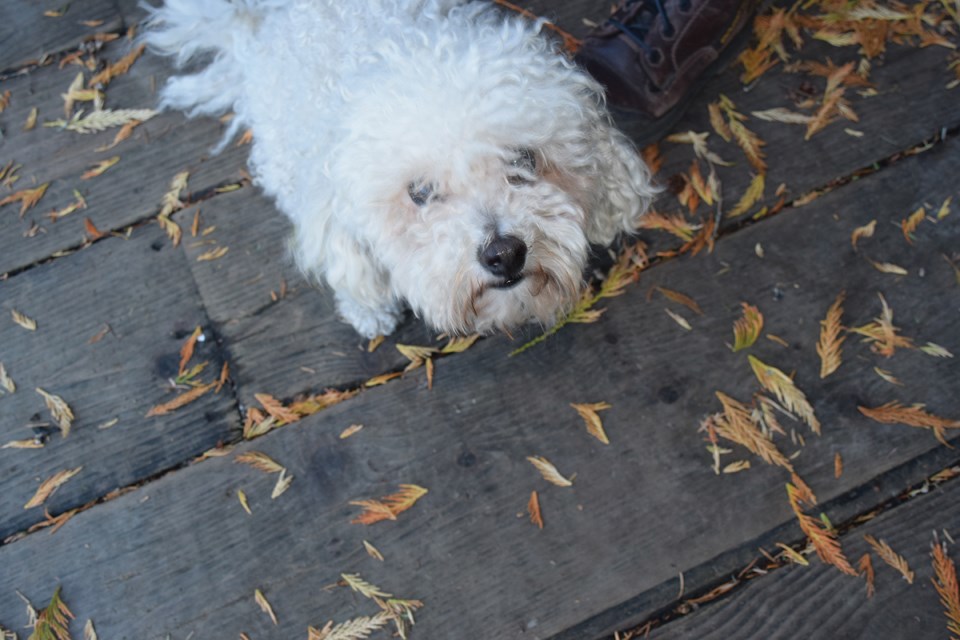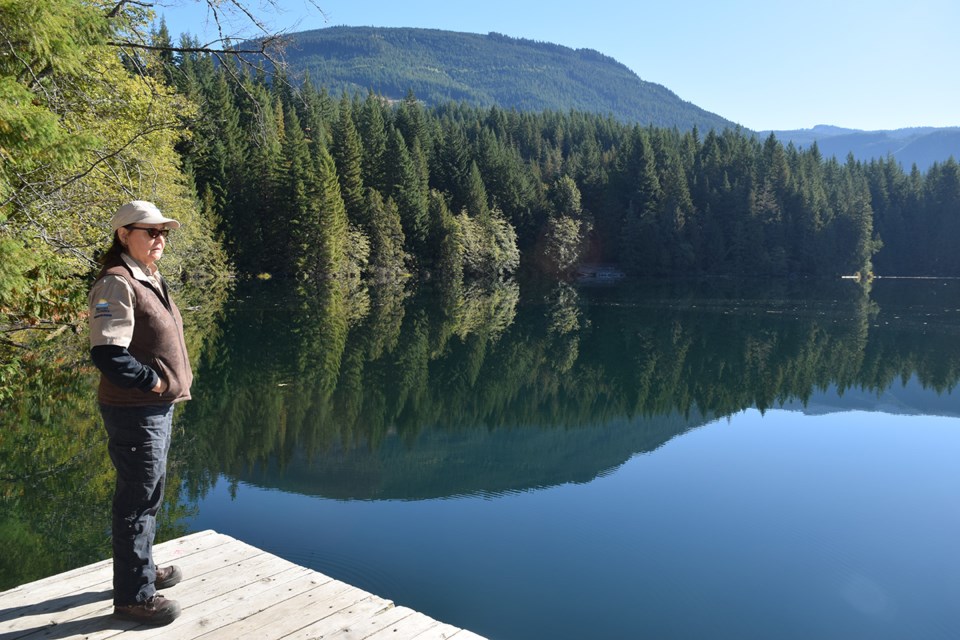Stopping mid-sentence, Lorraine Moody looks out over Cat Lake for a moment, taking in the still water and gently swaying giant Douglas Fir and Cedar trees that line its shore. “I feel honoured,” she says finally. “I found my place where I can work and I am going to be happy.”
Moody is a recreation site officer at the Cat Lake Campground, overseeing its close to 50 forested walk-in campsites.
The provincial campground is operated by Sqomish Forestry Limited Partnership, which employs Moody.
The Chief followed Moody, a proud Squamish Nation member, while she worked at the lake on a sunny day last week. Her nine-year-old Bichon Frise, Rhett Butler– named after the Gone With the Wind character, which was Moody’s mom’s favourite movie – sat in the car watching out the window or followed closely behind her owner.
Q: So, you mentioned a bobcat attacked Rhett in 2010, what happened?
A: He was with my son on the trails above Alice Lake one Sunday. I wasn’t aware there was a bobcat up there. I was working here and my son called me and told me that Rhett was OK, but had been attacked. Rhett was bleeding and my son wrapped him in his sweater. The bobcat had ripped Rhett down his right side. We went to two vets and both were closed, but then Dr. Honey was open. He needed 25 staples. He was quiet for a couple of weeks and barely moved. I wrapped him up in a blanket and slept with him sometimes. A couple of weeks later, he got up and said, “I am going to start walking around again.”
Rhett was the fourth dog to be attacked so the bobcat was eventually put down, I guess, cause he was very sick.
I like working with Rhett. I am alone here some days, so it is nice to have him.
Q: It is such a beautiful place to work, are you used to it or is it still pretty to you?
A: I appreciate it every day. I am very lucky and honoured to be chosen to work in the forest and that I was recognized by the chiefs and council of the Squamish Nation and get to work in a place like this and look after people. I get to meet people from around the world.
Q: Tell me a bit about who you meet.
A: I had a young couple here a few weeks ago from Germany who were camping on their honeymoon. They got married a year and a half ago and then they saved up their money to come to B.C. and they stopped here.
There was also a guy from Spain, Antonio, who rode his bike from Vancouver on May long weekend. He was all in his riding gear. He got up here and wanted to camp, but the site was full. As he was getting on his bike to go, my friend called me to say she couldn’t make it up to take her booked camping spot. I asked her if I could give her site away. She said sure and so I called him to come back. He didn’t have cash on him so I “super hosted” him as a guest of the Squamish Nation. He was so tired and he gave the biggest smile.
Q: You grew up in Squamish and still live here. How was it going to school here? I have heard from some First Nations that it wasn’t easy in public school back then.
A: It was different. Children were cruel. They would call me names but then there were the ones in the classroom that would say, “That isn’t very nice, you shouldn’t be talking that way.”
When you come from a big family you get used to people making comments though! I come from a family of 13 kids — nine girls and four boys.
Q: Wow, such a big family. What is the most important thing you learned from your parents?
A: My father worked in forestry, in the Elaho valley. That is where I started working too.
What my dad taught me, growing up as a young girl facing prejudice, was, “If you worry about what people are saying to you all the time, it is always going to weigh you down and you are going to miss out on life.”
Q: You have been doing this job for seven camping seasons, have you seen an increase or change in the campers?
A: Yes. This year and last year we saw a lot. It can be up to 400 people camping at a time here on a busy day.
Q: Tell me about the job.
A: I work April to end of October. I like to start the day with a coffee and a muffin at McDonalds. I drive up here and turn up the Cat Lake road. I sit on the Cheekye Bridge, open up my windows and I say my prayer for the day. I pray for my loved ones and for safe travels for my three children and grandkids.
My workday is never the same one day to the next. I host the campers, I sign them in, I give them the campsite regulations and then the rest of the day I am inspecting and making sure they are following those regulations, and I do paperwork. I let my coworkers coming on shift later know there is a bigger group of campers, or noisy campers or if there are some regulars. There are some people who come two to five times per season – I have gained a lot of friends working here.
The important part of my job is to take care of the wildlife. We humans are the ones visiting here and if we are going to leave our food out, that bear that comes along could be put down. A fed bear is a dead bear, as they say. I am real with campers. This season we had five bears visit the outskirts of the campground.
Q: Cat Lake has had a reputation for being a bit loud, can you comment on that?
A: I find that people who come from the city live in a loud and fast-paced environment so when they come here they are bringing that fast pace with them. A lot of them aren’t aware of their environment, until they get loud with me. I usually go shhhhh [puts her finger to her lips]. I think they look at me as a mother of sorts. They will say, “What are you going to do Lorraine, if we don’t listen?” and I say, “Do you want to see the mother in me come out?” It always makes the person smile and laugh.
Q: What do you wish people knew about this site or camping here.
A: To enjoy the pace and tranquillity of Cat Lake. That is one of the things I like to teach people when they come, just enjoy being here.




